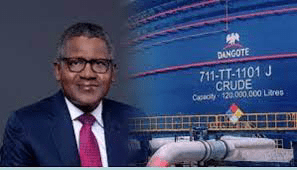Dangote’s Cooking Gas Price Slash Plan Triggers Monopoly Fears Among Marketers
Aliko Dangote has set off fresh waves of controversy within Nigeria’s energy sector with his latest pledge to slash the retail price of cooking gas, a move he says is aimed at easing the burden of high energy costs on millions of households.
READ ALSO:PSG President Reacts After Club World Cup Defeat to Chelsea
Speaking during an engagement with members of the CGEO Africa at Lagos Business School’s Lekki refinery tour, the billionaire industrialist declared his readiness to bypass distributors if they fail to reduce prices, vowing to sell Liquefied Petroleum Gas (LPG) directly to consumers.
“If the distributors are not trying to bring it down, we’ll go directly and sell to the consumers,” Dangote said. “We want to make it cheaper so people will switch from firewood and kerosene.”
READ ALSO:
While Dangote frames the plan as a public-spirited intervention to promote cleaner, safer energy use, industry stakeholders are raising alarm bells over what they describe as a dangerous drift towards monopoly.
Godwin Okoduwa, former Chairman of the LPG and Natural Gas Downstream Group of the Lagos Chamber of Commerce and Industry, warned that Dangote’s strategy could cripple smaller players in a market that has seen steady, collaborative growth over the years.
> “You can’t grow an industry by wiping out existing players,” Okoduwa argued. “The Nigerian LPG market expanded from 70,000 tonnes in 2007 to over 1.3 million tonnes by 2022 through collaboration—not dominance. One player shouldn’t dictate everyone’s fate.”
He advised Dangote to channel his resources towards developing infrastructure in underserved regions like the North-East rather than disrupting existing supply chains in the South.
Similarly, Bassey Essien, Executive Secretary of the Nigerian Association of Liquefied Petroleum Gas Marketers, expressed skepticism over Dangote’s assurances, describing them as “unrealistic.”
READ ALSO:Man Who Mocked Buhari’s Death Loses His Father Within 24 Hours
> “Look at petrol,” Essien remarked. “Has the refinery sold it directly to consumers at cheap rates? Cooking gas will end up the same way.”
Despite these concerns, Dangote remains firm, maintaining that driving down the cost of LPG is crucial to reducing Nigeria’s reliance on firewood and kerosene, which contribute to deforestation and health risks from indoor air pollution.
As tensions mount, analysts suggest the months ahead will determine whether Dangote’s efforts position him as a champion of affordable energy—or as the architect of a monopolistic grip on Nigeria’s LPG sector.




